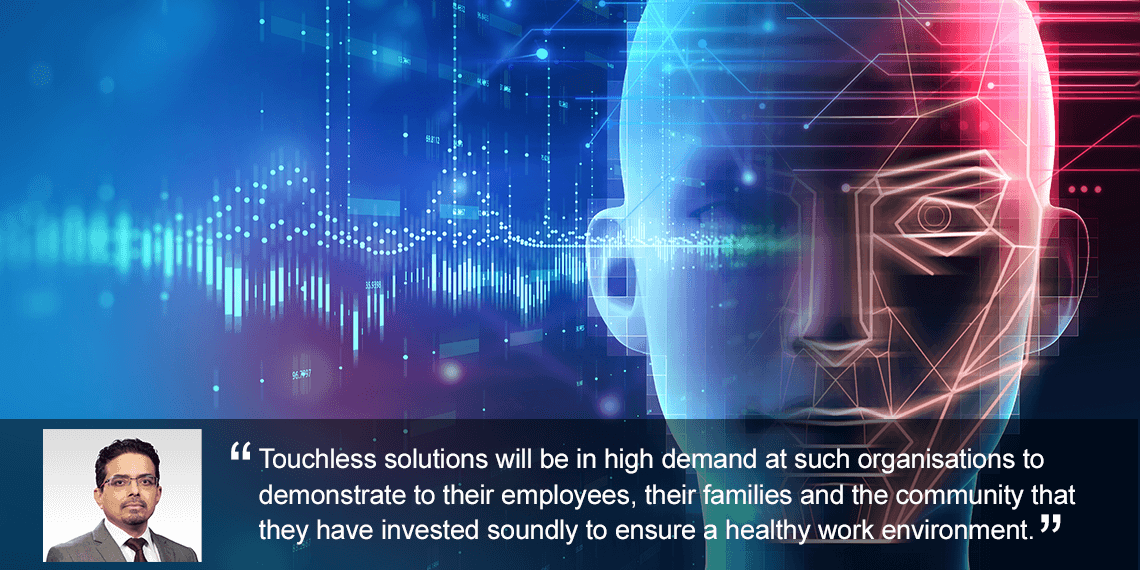Interview with the CEO: Touchless Technology is The Future of Secure Access
The sudden grip of the coronavirus pandemic sent people across the globe into the biosecure bubbles of their own homes. Organizations across the whole world and in all sectors had to adapt. A challenge that was ably supported by the initiatives and innovations of the technology community. Against this backdrop, we speak to Shiraz Kapadia, CEO and President of Invixium, one of the world’s leading biometrics developers, to understand how they responded to the urgent need for greater workforce security and what the future holds for biometrics.
How has the Covid-19 pandemic impacted the development of biometrics?
Heading into 2020, we were looking forward to penetrating new markets with our portfolio of modern biometric products, majority of which were fingerprint based. When the pandemic hit, there was an immediate shift to touchless and contactless technology because, suddenly, no one wanted to touch anything because they were afraid of spreading COVID. This triggered a dramatic drop in the demand for fingerprint biometrics, almost overnight. On the contrary, face recognition technology gained almost a decade’s worth of adoption during the pandemic period.
Entrances that were focused on access control and workforce management became so much more, and I see this as a positive thing. COVID-19 propelled the adoption of modern technology that makes entrances more valuable. Leading manufacturers are adding temperature and wellness screening, no-mask detection, and face recognition while wearing a mask to their biometric offerings because these integrated, all-in-one solutions are now what the enterprise world needs.
How have developments in other technology, such as AI/Machine learning combined with biometric technology to impact security, health, and wellness?
The typical product development cycle in our industry is 1 to 2 years, but this is unacceptable during COVID-19. Industries that help bring people back to work need to evolve quickly and doing everything yourself is slow. When a company wants to develop a new solution quickly, they should analyze what technologies they currently have and find partners who can fill the gaps effectively. We have taken the lead in integrating other solutions with our technology and vice-versa to create a diverse ecosystem of top-notch partners to deliver a customizable end-to-end solution.
Security and biometric companies should provide an autonomous, all-in-one solution. Many of these technologies are based on machine learning or AI because they require accurate matching and data analysis, which improve biometrics’ accuracy, functionality, and adaptiveness to respond to the pace at which our world is changing.
How would you respond to suggestions that a heavy focus on touch-free technology is a ‘fad’ of its time, and that once concerns surrounding the pandemic ease organizations and people will be happy to revert to touch technology?
Touchless technology is here to stay. People will be apprehensive to touch shared surfaces for decades to come – in our not-so-distant past, we needed vaccine cards to travel from certain countries to others, and this went on for about a decade.
In light of government lockdowns and stay-at-home orders, in reality there is a high percentage of work that simply cannot be performed at home; hence it will be difficult to prevent the spread of illness. For the management teams and owners of essential businesses, a challenge brought on by the pandemic was the added responsibility to address the health and safety concerns of employees who are required to come into the worksite, and their families whom they return to after work. Touchless solutions will be in high demand at such organizations to demonstrate to their employees, their families and the community that they have invested soundly to ensure a healthy work environment.
In this era of information, data from our medical history also shows that pandemic outbreaks have increased in frequency over the last 50 years due to globalization and modernization. Because of this, touchless security is going to be a concern for the global community at large now and in the foreseeable future.”
What principles underpin Invixium’s approach to privacy and biometrics?
Biometrics should be banned from surveillance technologies. Because we sell into the physical access and workforce management markets, we are very strong proponents of keeping information private. Rather than worry about privacy concerns, biometric companies should focus on educating people. Getting consent to capture biometrics – if explained properly and with transparency – is easy to do because companies are using this technology to protect the health, safety, and security of their staff and visitors.
As with all cutting-edge technologies high costs can present barriers to uptake for smaller organizations and those in emerging markets. How does Invixium approach questions of affordability in different markets?
Instead of putting the focus on the cost of the technology, shouldn’t the top consideration be the potential productivity loss if an individual enters a worksite while they are COVID-19 positive, forcing a shutdown? The cost of something is relative to the cost incurred by not having it. Based on the new technology available on the market, businesses now have the option to implement a biometric system that provides multifaceted protection against a combination of COVID-19, time theft and unauthorised access, making the upfront investment a sound decision and better yet, a proactive one. While advancements in biometrics due to economies of scale are helping costs go down, the real question is about ROI. Yes, plastic access cards are cheaper to buy, but they cannot prevent shutdown in the same way that touchless biometrics and wellness screening can.
As a final message, what is the future for biometrics and for Invixium?
This is our passion. At Invixium, we believe that biometric technology has the potential to make the world a better, healthier, more productive place, and we are proud to be a part of the race to keep people healthy at work.
Contact us:
sales@invixium.com
For more information, visit:
invixium.com




